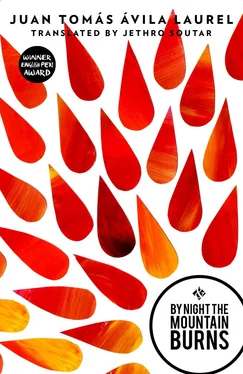Juan Ávila Laurel - By Night the Mountain Burns
Здесь есть возможность читать онлайн «Juan Ávila Laurel - By Night the Mountain Burns» весь текст электронной книги совершенно бесплатно (целиком полную версию без сокращений). В некоторых случаях можно слушать аудио, скачать через торрент в формате fb2 и присутствует краткое содержание. Год выпуска: 2014, Издательство: And Other Stories Publishing, Жанр: Современная проза, на английском языке. Описание произведения, (предисловие) а так же отзывы посетителей доступны на портале библиотеки ЛибКат.
- Название:By Night the Mountain Burns
- Автор:
- Издательство:And Other Stories Publishing
- Жанр:
- Год:2014
- ISBN:нет данных
- Рейтинг книги:5 / 5. Голосов: 1
-
Избранное:Добавить в избранное
- Отзывы:
-
Ваша оценка:
- 100
- 1
- 2
- 3
- 4
- 5
By Night the Mountain Burns: краткое содержание, описание и аннотация
Предлагаем к чтению аннотацию, описание, краткое содержание или предисловие (зависит от того, что написал сам автор книги «By Night the Mountain Burns»). Если вы не нашли необходимую информацию о книге — напишите в комментариях, мы постараемся отыскать её.
By Night the Mountain Burns — читать онлайн бесплатно полную книгу (весь текст) целиком
Ниже представлен текст книги, разбитый по страницам. Система сохранения места последней прочитанной страницы, позволяет с удобством читать онлайн бесплатно книгу «By Night the Mountain Burns», без необходимости каждый раз заново искать на чём Вы остановились. Поставьте закладку, и сможете в любой момент перейти на страницу, на которой закончили чтение.
Интервал:
Закладка:
I almost always saw grandfather sitting in the same place. I never saw him eat and I never saw him talk, by which I mean what might properly be called talking. He made minimal communications but I myself never had a conversation with him. Nor did I ever hear him say a word to anyone, although I know, from what my brothers and sisters told me, that he did occasionally talk to one of his friends. Of course a long time has passed since then, since the last time I saw my grandfather, and it could be that I did have short conversations with him when I was very little but that I no longer remember them. Yes, that could be so.
You entered the house at ground level and then went up some stairs into a living room. That living room gave on to a balcony where you could see practically the whole village, although we don’t call it a village in my language; the word we use is more like town or capital city. Anyway, like I said, you went into the living room and came out on a balcony that looked towards the Pico, and you’d see grandfather sitting there with his back to you, in a chair made out of esparto grass. He positioned the chair a little away from the balcony handrail, as if not wanting to expose himself fully in public. He’d be dressed in a shirt, a V-neck sweater and brown trousers, almost always with a towel draped over his thighs, although he was never seen without his trousers on. The first thing that you noticed about the man was that he’d shaved off half his hair, by which I mean the hair had been deliberately removed, for there was nothing to suggest an accident had caused him to lose half his hair. Well, I suppose it wasn’t quite half, but it was the better part of half, and it was shorn right down to the bone. What was this? Why didn’t he shave the other half off too, or let the shaved half grow so that it was all uniform? Was it some kind of fashion? And if it was, could someone not have told him it looked awful? That it was really very ugly and didn’t suit him at all?
Whenever any of us went out on the balcony, we’d greet him, for he was our granddad, and he’d make a gesture to show us he’d heard. He might briefly look at his feet to check he wasn’t being bitten by mosquitoes, but he never turned to look at us and answer. Sometimes one of the younger children of the house would go upstairs because they were learning to talk and they knew that the man up there was their grandfather, so they went up there and leaned on the armrest of his chair and asked him questions or tried to make conversation, but grandfather would do no more than look briefly at the child and then carry on attending to the mosquitoes. He didn’t get annoyed, but when he thought the child had said enough he looked inside the house for an adult to come and take the child away, which was what usually happened. Sometimes, if he thought the child was old enough to be left on its own without an adult, he’d get up, for grandfather could walk, and lead the child downstairs. But his leading the child downstairs was actually no more than his placing the child at the top of the stairs and giving the boy or girl a little push to help them on their way.
Any child in the house who was prone to crying already had plenty of reasons to do so and there was no need to make matters worse by visiting that man upstairs who never spoke to you. This was to his advantage, for I can’t imagine what would have happened if one of the biggest cry-babies in the house had gone up there and made him angry, even made him shout. Of course it possibly did happen, but I never saw it. I think little children are able to sense an adult’s kindness, if not their friendliness, and they avoid adults that seem sullen.
Although men usually represent family security on the island, I always felt more secure and connected to the women in our household. This could have been due to my grandfather’s particular nature, but I think it had more to do with my grandmother. Grandfather was always around, yes, but one day it occurred to me that maybe he had nothing to do with the family, that maybe he wasn’t even from the island. What if he were an incomer, someone who’d got lost on his way home and had taken shelter on our island but knew nobody? What if he’d arrived by sea, all alone, as we were told the images of the church saints had done, and that was why he didn’t know how to talk, just as the images didn’t? This was what I thought as a child, and I regret that grandfather never let us know more about him. And I never imagined that one day I’d be telling the story of my childhood.
When our mothers went off to their plantations they left the youngest children in the care of an adult of the house, if there was an adult who wasn’t going to the plantations for some reason, or in the care of older children, ideally a girl. Entrusting children to a girl was best, because girls are more responsible, but that way you sacrificed someone capable of doing more work on the farm and bringing back a heavier load than a boy. As a child I never understood why girls had a greater capacity for carrying weights on their heads, but now I suppose boys and girls probably have the same capacity, just we boys used to complain and cry about how heavy the loads were while the girls didn’t. This might have been because they were under more pressure to put up with it, because one day they’d become women and they’d be talked about and labelled lazy if they started crying because of the weight of a load. But doubtless they hurt just as much as we did.
Anyway, one day we children were left on our own in the house, and a plane flew over the village. Most of us had never heard or seen a plane so close before, and so it gave us all quite a fright. One of the youngest children in the house was so frightened he climbed the stairs and went crying to grandfather, seeking the comfort of an adult embrace. Grandfather understood and saw that though the plane was long gone, the boy was still afraid and sought refuge in his grandfather’s lap, which meant he stuck his head between grandfather’s thighs and closed his eyes. The boy thought it the safest place for him, and the old man understood his grandson’s fear and comforted him by stroking his back with his hand. It was a very brief show of affection. Or maybe it was such an effective show of affection that the boy immediately felt at ease. Either way, he came back downstairs and played with the rest of us, and though we’d all been frightened by the plane, none of us had thought to seek grandfather’s protection.
The house I grew up in was full of women, my grandparents having had only daughters. We children were the offspring those women had brought into the world and, as they were all about the same age, and saw that their mother, our grandmother, was still fit and strong, they had us believe that grandmother was really our mother. We never spoke of our fathers. If we needed a man to comfort us, we went upstairs to talk to the only one we had, he who sat staring at the mountain. I’ve already said what happened then.
Grandmother had a niece who came to our house a lot. She was chubby, with fat thighs, and she was very smiley; I never saw her get angry about anything. When she came to the house we all competed to throw ourselves into her loving arms. She hugged us each in turn, and after she’d greeted and kissed everyone, and after she’d talked to the other girls her age in the house, she would go upstairs, pull over a chair and sit down next to grandfather, her back to the balcony rail. She went up there to chat to him, to tell him things, tell him about her life. Armed with her cheeriness and her smile, she told grandfather things, she smiled, she laughed, and it was as if they really were chatting. Was that aunt of ours so smart and kind that she knew how to make conversation with him, even though he never replied to anything she said? Did she know how to choose the right words so that he didn’t need to respond to them, so that only she had to speak but there was no lack of communication? While she talked to him, she never stopped laughing, as if she were chatting away to a normal person. Did she have some ability we lacked? Did she know how to read grandfather’s gestures and communicate with him that way? Did they have a secret they shared?
Читать дальшеИнтервал:
Закладка:
Похожие книги на «By Night the Mountain Burns»
Представляем Вашему вниманию похожие книги на «By Night the Mountain Burns» списком для выбора. Мы отобрали схожую по названию и смыслу литературу в надежде предоставить читателям больше вариантов отыскать новые, интересные, ещё непрочитанные произведения.
Обсуждение, отзывы о книге «By Night the Mountain Burns» и просто собственные мнения читателей. Оставьте ваши комментарии, напишите, что Вы думаете о произведении, его смысле или главных героях. Укажите что конкретно понравилось, а что нет, и почему Вы так считаете.












